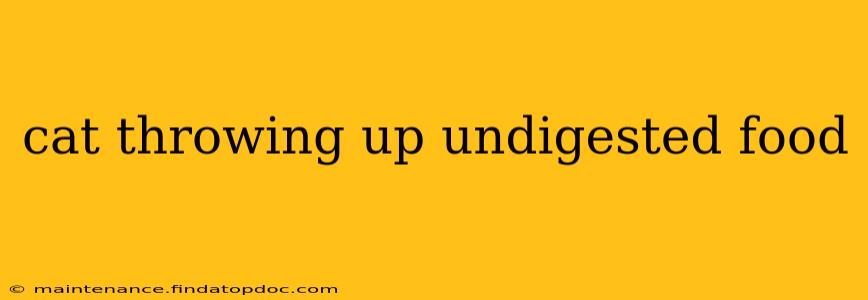Cats, those enigmatic and often finicky creatures, are prone to the occasional (or sometimes frequent!) episode of vomiting. While a bit of hairball now and then is normal, repeated vomiting of undigested food warrants attention. Understanding the underlying causes is crucial for addressing this issue and ensuring your feline friend's health and well-being. This comprehensive guide will explore the common reasons behind a cat throwing up undigested food, preventative measures, and when it's time to seek veterinary care.
Why is My Cat Throwing Up Undigested Food?
Several factors can contribute to a cat regurgitating undigested food. Let's delve into the most common causes:
Dietary Issues:
- Sudden changes in diet: Switching cat food abruptly can upset their sensitive digestive systems, leading to vomiting. Introduce new food gradually, mixing it with their old food over several days.
- Food allergies or intolerances: Certain ingredients, like dairy, beef, chicken, or wheat, can trigger allergic reactions or digestive upset in some cats, resulting in vomiting undigested food. Identifying and eliminating the offending ingredient is key.
- Eating too fast: Voracious eaters might gulp down their food without properly chewing, leading to undigested food coming back up. Slow feeder bowls can help mitigate this.
- Poor quality food: Low-quality cat food often lacks essential nutrients and can be difficult to digest, resulting in vomiting. Opt for high-quality food that meets your cat's specific needs (kitten, adult, senior).
Gastrointestinal Problems:
- Inflammatory bowel disease (IBD): This chronic condition causes inflammation in the digestive tract, hindering proper digestion and absorption of nutrients.
- Pancreatitis: Inflammation of the pancreas can disrupt digestive enzyme production, leading to incomplete digestion and vomiting.
- Infections: Viral, bacterial, or parasitic infections can cause inflammation and irritation of the gastrointestinal tract, resulting in vomiting.
- Gastritis: Inflammation of the stomach lining can also cause vomiting.
Other Potential Causes:
- Stress and anxiety: Changes in the environment, new pets, or even loud noises can cause stress, leading to digestive upset and vomiting.
- Hairballs (though usually not undigested food): While cats often cough up hairballs, excessive hairball vomiting can sometimes be accompanied by partially digested food.
- Obstructions: Foreign objects, such as toys or string, can obstruct the digestive tract, causing vomiting.
- Certain medications: Some medications can have gastrointestinal side effects, including vomiting.
How Can I Prevent My Cat From Throwing Up Undigested Food?
Preventing this issue involves a multi-pronged approach:
- Gradual diet changes: Always introduce new food slowly.
- High-quality food: Choose a cat food that's specifically formulated for your cat's age and health needs. Look for high-protein options with easily digestible ingredients.
- Slow feeder bowls: These bowls help slow down eating speed, reducing the likelihood of vomiting.
- Regular veterinary checkups: Preventative care, including routine blood tests and fecal exams, can help identify potential underlying health problems.
- Manage stress: Create a calm and stable environment for your cat.
- Grooming: Regular brushing helps reduce hair ingestion and the incidence of hairballs.
When Should I Take My Cat to the Vet?
While occasional vomiting of undigested food might not be a cause for immediate concern, it's essential to monitor your cat closely. Consult your veterinarian if:
- Vomiting is frequent or persistent: If your cat vomits undigested food multiple times a day or for several consecutive days.
- Your cat shows other symptoms: Lethargy, loss of appetite, diarrhea, weight loss, or dehydration warrant immediate veterinary attention.
- Vomiting is forceful or contains blood: This can indicate a more serious underlying problem.
- Your cat is exhibiting signs of pain or discomfort: Straining to vomit, abdominal pain, or unusual vocalizations require prompt veterinary care.
What if My Cat is Throwing Up Bile?
This is a separate issue, and while it might sometimes be accompanied by undigested food, bile vomiting often indicates an empty stomach. It usually warrants veterinary attention, as it can signal underlying problems such as gastritis or IBD.
By understanding the various reasons why a cat might throw up undigested food, implementing preventative measures, and seeking veterinary care when necessary, you can ensure your furry friend’s health and happiness. Remember, early intervention is key to addressing any underlying health issues.
